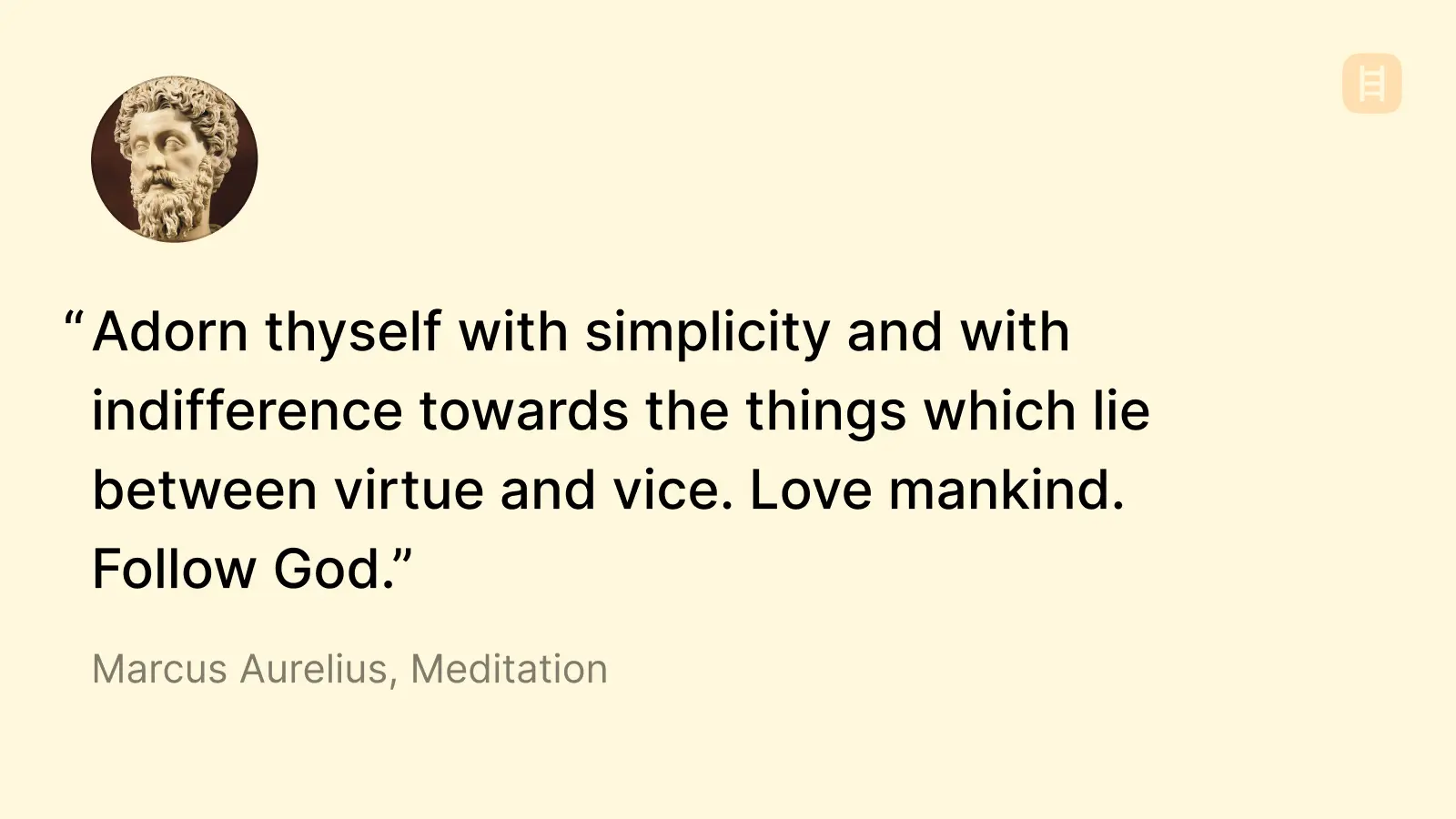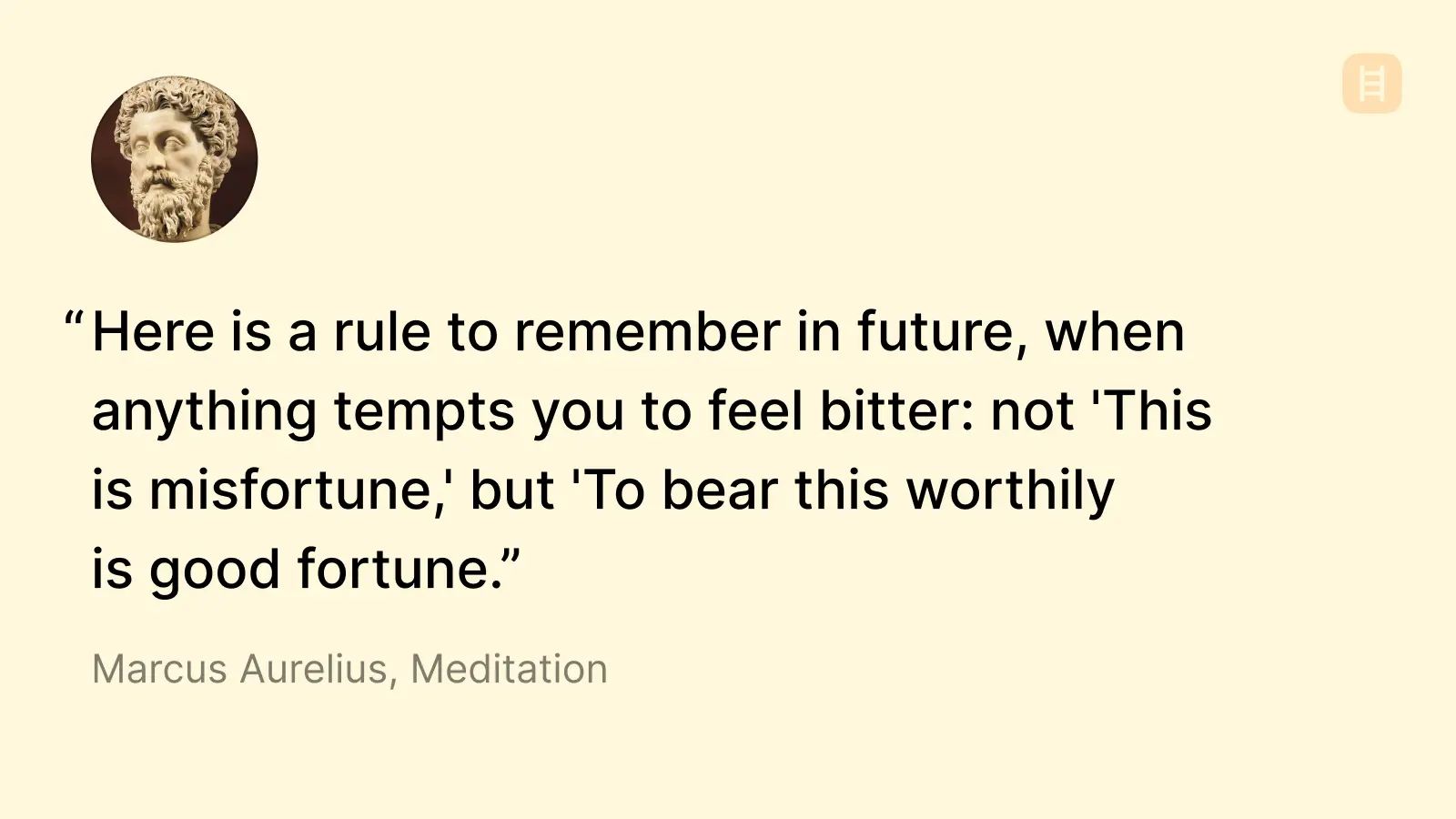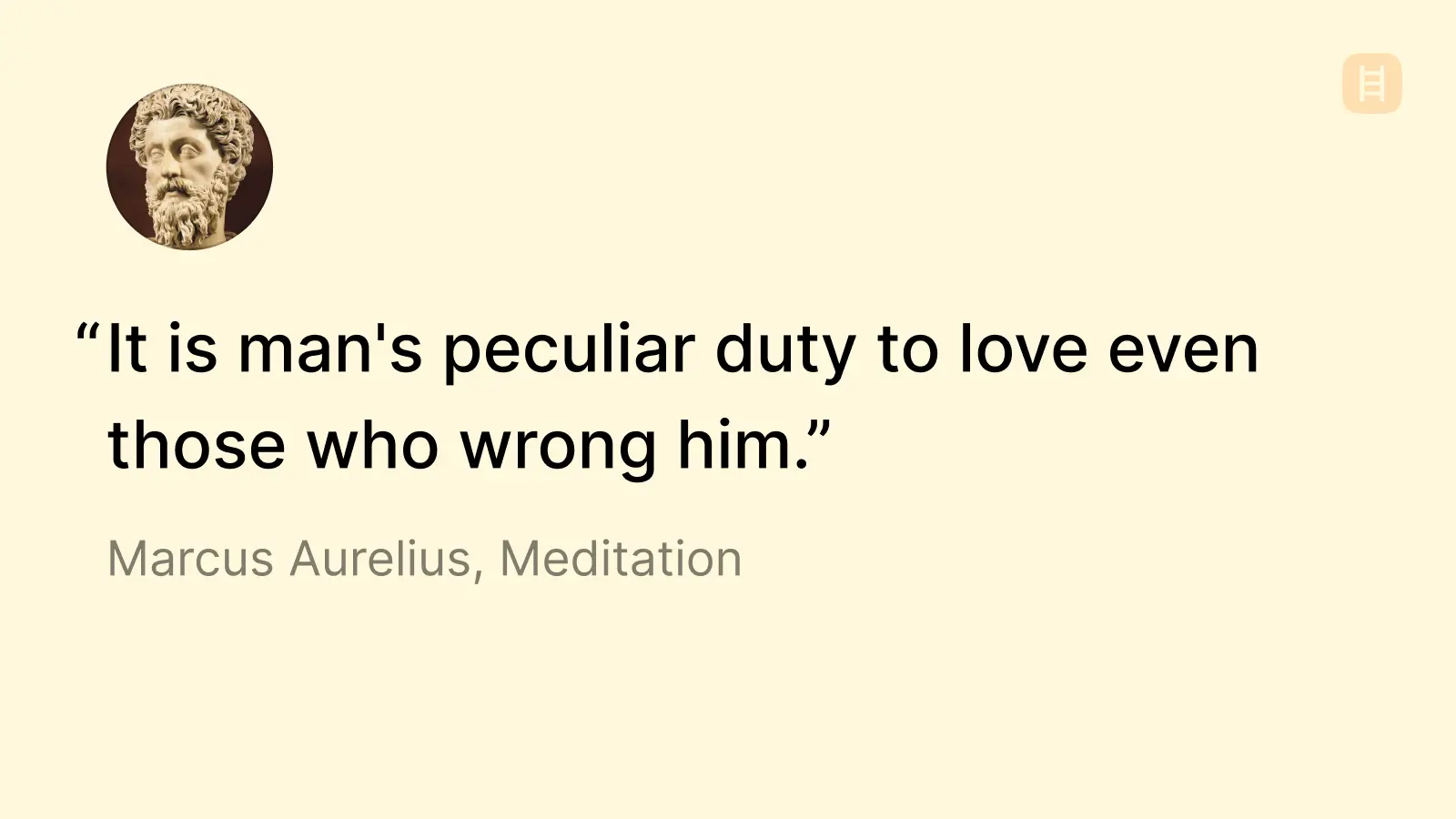Marcus Aurelius was by far one of the most influential Stoic philosophers whose reflections on virtue, reason, and love continue to resonate today. At a young age, Marcus Aurelius, who ruled as Roman Emperor from 161 to 180 AD, developed an interest in Stoic philosophy, which emphasizes leading a virtuous and moral life. He admired Epictetus because he lived modestly, just like Aurelius tried to do.
As we explore Aurelius' story, we'll see how Stoicism shaped his life and leadership. Step into the world of Marcus Aurelius, the philosopher-king of ancient Rome, where his ‘Meditations’ offer a glimpse into his inner dialogue. Beyond being a guidebook, these reflections are a personal conversation about life's challenges. Think of ‘Meditations’ as Aurelius's diary, where he shares thoughts on love and how we relate to others. He didn't just give advice; he shared his struggles and triumphs.
Marcus Aurelius' quotes: What he teaches us about love and relationships
Marcus Aurelius described the ideal Stoic as free from unhealthy, irrational passion yet full of love. Seneca the Stoic also wrote about love:
"If you wish to be loved, love."

So, living in harmony and friendship with others seems part of what the Stoics meant by "living in harmony with nature." However, compared to our reality today, it could be some sort of distant utopian ideal. The cardinal virtue most directly related to our interaction with others is "justice." For the Stoics, justice is a form of social and moral wisdom. It consists of two essential elements:
Kindness or benevolence towards others;
Fair and impartial treatment of others.
Marcus Aurelius’ love quotes to humanity
"The soul becomes dyed with the color of its thoughts."

Marcus Aurelius, the Roman Emperor, and Stoic philosopher, often emphasized the importance of one's thoughts and inner disposition. This quote reflects his belief that our thoughts shape our character and ultimately define us.
Marcus believed in the importance of treating others with kindness and understanding. He advocated for love and compassion towards others as essential to leading a virtuous and fulfilling life.
"Accept the things to which fate binds you, and love the people with whom fate brings you together, but do so with all your heart."

"Adapt yourself to the life you have been given; and truly love the people with whom destiny has surrounded you."

In his ‘Meditations,’ Marcus Aurelius frequently contemplates the nature of humanity and our place in the world. One of his fundamental teachings is cosmopolitanism, which means that community service contributes to success and satisfaction in what you do. The mental attitude of accepting everything that happens with joy is the ability to have a peaceful and calm state of mind, even under challenging circumstances.
"Adorn thyself with simplicity and with indifference towards the things which lie between virtue and vice. Love mankind. Follow God."

"Adapt yourself to the environment in which your lot has been cast, and show true love to the fellow-mortals with whom destiny has surrounded you."

Marcus Aurelius on love in family life
Marcus didn't write extensively on family life in his famous work ‘Meditations,’ but his philosophical principles can be applied to various aspects of life, including family relationships. Here are some rare quotes where children and parents are mentioned.
"...the healthy understanding ought to be prepared for everything which happens; but that which says, Let my dear children live, and let all men praise whatever I may do..."

"Of my grandfather Verus I have learned to be gentle and meek, and to refrain from all anger and passion... I have learned both shamefastness and manlike behaviour. Of my mother I have learned to be religious, and bountiful; and to forbear, not only to do, but to intend any evil; to content myself with a spare diet, and to fly all such excess as is incidental to great wealth."

Marcus Aurelius’ views on love for what you do
In ‘Meditations,’ the philosopher emphasized the axiological virtues of man, such as decency, integrity, and caring for other people to preserve the common good. He wrote that to live a blessed and divine life, one must conduct one's affairs with dignity and love for people and without recklessness, hypocrisy, and dissatisfaction with one's fate. Personally, Marcus Aurelius, by his example, showed dedication to his work as a ruler, legislator, and military commander.
"Love the little trade which thou hast learned, and be content therewith."

"People who love what they do wear themselves down doing it, they even forget to wash or eat. Do you have less respect for your own nature than the engraver does for engraving, the dancer for the dance, the miser for money or the social climber for status? When they're really possessed by what they do, they'd rather stop eating and sleeping than give up practicing their arts."

Life quotes
One of the central tenets of Stoicism is cosmopolitanism, which advocates for a sense of belonging to the entire world rather than just one's immediate community or nation. Marcus Aurelius, in particular, embraced this idea of cosmopolitanism, believing in a universal kinship among human beings regardless of nationality, ethnicity, or social status. He believed in the connection of humanity and the importance of mutual support and growth.
"Men exist for the sake of one another. Teach them then or bear with them." (Long translation)

Marcus Aurelius promised people only one reward - complete peace of mind when absolute balance is achieved inside and outside - with the surrounding world:
"The happiness of your life depends upon the quality of your thoughts."

"When you arise in the morning, think of what a precious privilege it is to be alive – to breathe, to think, to enjoy, to love."

According to Marcus Aurelius, if there is an obstacle in your path that manages to interrupt your action, at the same time, it will not be able to change your spiritual aspiration similarly.
"Here is a rule to remember in future, when anything tempts you to feel bitter: not "This is misfortune," but "To bear this worthily is good fortune."

Marcus Aurelius on finding the beauty of life
Inspirational quotes add delight to Aurelius' diary. He proposed finding ways to enjoy what is happening instead of struggling with what you cannot change. For example, try to find beauty in nature, watch people, and admire art.
"Dwell on the beauty of life. Watch the stars, and see yourself running with them."

"Earth loves the rain, the proud sky loves to give it." The whole world loves to create futurity. I say then to the world, "I share your love."

Virtuous love in Marcus Aurelius’ Stoic teachings
Marcus Aurelius believed in virtuous love to express moral integrity and inner strength. For him, love was not merely an emotion but a principle rooted in Stoic philosophy. Stoic love and friendship do not require reciprocity. Stoic is kind and gentle because it’s virtuous, not because a person hopes to gain something by being kind to others.
"The best revenge is to be unlike him who performed the injury."

"Waste no more time arguing about what a good man should be. Be one."

Thoughtful and affectionate care for others is essential among character qualities. Marcus Aurelius, like other Stoics, often referred to the "brotherhood of mankind," the "citizenship of the world," and the idea that we are all part of the great organism of human beings, intelligent and social animals. But no matter how critical the emperor-philosopher was to human nature, he saw a neighbor in every person because everyone is part of a single ordered Whole governed by common reason. And no one is ideal.
"When you wake up in the morning, tell yourself: The people I deal with today will be meddling, ungrateful, arrogant, dishonest, jealous, and surly. They are like this because they can't tell good from evil." (Hays translation)

Stoic mentors taught the future emperor Aurelius an incredibly high discipline of mind and emotions:
"Live a good life. If there are gods and they are just, then they will not care how devout you have been, but will welcome you based on the virtues you have lived by. If there are gods, but unjust, then you should not want to worship them. If there are no gods, then you will be gone, but will have lived a noble life that will live on in the memories of your loved ones."

"Not to display anger or other emotions. To be free of passion and yet full of love." (Hays translation)

Marcus Aurelius’ lessons on acceptance and compassion
Reflections of Marcus Aurelius are rich in thoughts about interpersonal and social relations. He believed that positive or good emotions in human life are focused on virtue instead of harmful and destructive emotions or "passions" based on ethical mistakes. He was convinced that people could make mistakes and that being merciful and accepting different people was good. Here’s one of Marcus Aurelius' quotes on acceptance:
"When thou wishest to delight thyself, think of the virtues of those who live with thee; for instance, the activity of one, and the modesty of another, and the liberality of a third, and some other good quality of a fourth."

"It is man's peculiar duty to love even those who wrong him."

Self-love and discipline in Marcus Aurelius’ philosophy
The idea behind Marcus Aurelius' philosophy is to counteract negative experiences by building inner strength and resilience. He believed in the power of inner strength and resilience to overcome adversity. This inner support serves as a source of nourishment and renewal. How do we get this support? Through virtue. No matter how strongly outsiders and their beliefs influence us, we remain the leading actors, ultimately committing the action.
"How easily we love ourselves above all others, yet we put more stock in the opinions of others than in our own estimation of self…"

Do only what your mind tells you. Marcus Aurelius believed that this is the dominant part of our being that directs actions for the benefit of people. You can change your mind if someone points out your mistake or manages to convince you. Aurelius believed that changing one's opinions should be guided by principles of justice, the common good, and moral integrity, rather than by personal convenience, pleasure, or the desire for glory.
"I have often wondered how it is that every man loves himself more than all the rest of men, but yet sets less value on his own opinion of himself than on the opinion of others."

Marcus Aurelius believed that we should master our minds to control our thoughts and actions. For the Stoics, living according to reason meant living happily.
"Whatever anyone does or says, for my part I’m bound to the good. In the same way an emerald or gold or purple might always proclaim: ‘whatever anyone does or says, I must be what I am and show my true colors."

How Marcus Aurelius' philosophies were shaped by personal and political challenges
Marcus Aurelius’ worldview was shaped by his leadership experiences and commitment to fulfilling his duties with integrity and compassion. His thoughts and philosophies about human relations were shaped by his adoption into the imperial family in childhood, his brilliant education based on Stoicism, and his later experience of ruling with a co-ruler, an unfaithful wife, and betrayals by partners such as Avidius Cassius. Marcus Aurelius faced all the challenges of Roman politics: insidious careerists, jealous rivals, incompetent and populist patricians, conspirators at every turn, and the emergence of a new religion. All these problematic circumstances taught him to accept people, forgive, and practice his virtue.
The reign of Marcus Aurelius was one of the most challenging periods in the life of the Roman Empire, but Stoic philosophy helped him as a way of solving problems to succeed in public affairs. He managed the empire when the internal and external situation of the Roman state sharply deteriorated: acute financial crisis, famine, and plague. Additionally, there were constant wars from Britain to Syria. Happy endings didn't happen often back then. Marcus Aurelius believed that a ruler's primary needs are love and respect for people and fulfilling his duty to them.
Read ‘Meditations’ with Headway to learn Marcus Aurelius’ wisdom on love
Dive effortlessly into Marcus Aurelius' wisdom, explore bite-sized summaries, or listen to ‘Meditations’ with the Headway app. His Stoic quotes constantly direct attention to the following truth: living happily means living according to nature, which means living according to reason. To do this, we need to activate thinking and respond to situations wisely. ‘Meditations’ is a rich food for the mind. In Marcus Aurelius' diary, we can find some support and the strength to cope with the ordeals that fall on us. That makes his philosophical thought very valuable to read.
Frequently Asked Questions
What did Marcus Aurelius say about marriage?
While 'Meditations' does not contain many direct references to marriage, Marcus Aurelius emphasized love, respect, and mutual understanding in human relationships. His object of life, grounded in Stoic wisdom, was to act with virtue and lead a harmonious existence. He believed in accepting the people fate brings into our lives and loving them fully: "Accept the things to which fate binds you, and love the people with whom fate brings you together, but do so with all your heart." This principle can be applied to marriage, where patience, virtue, and compassion are essential Stoic values.
What was Marcus Aurelius' most famous quote?
One of the best Marcus Aurelius quotes is: “The happiness of your life depends upon the quality of your thoughts.” This Stoic insight highlights the importance of controlling one’s mindset to achieve inner peace and resilience — a principle often echoed by the Daily Stoic community today. Another widely cited quote is: “When you arise in the morning, think of what a precious privilege it is to be alive – to breathe, to think, to enjoy, to love.” These powerful words continue to inspire positivity and self-reflection across generations and even on social media platforms where Stoic wisdom thrives.
Can a Stoic person fall in love?
Yes, Stoicism does not prohibit love. In fact, Marcus Aurelius and other Stoic philosophers viewed love as a rational and virtuous bond that aligns with the object of life — to act justly, wisely, and with compassion. A Stoic person can experience deep, meaningful love while maintaining emotional balance and moral integrity, a concept often explored in modern Daily Stoic teachings.
Can a Stoic man cry?
While Stoicism encourages self-control, it does not forbid emotions or crying. As highlighted by the Daily Stoic philosophy, mastering destructive passions does not mean suppressing natural, healthy emotions like grief or empathy. Marcus Aurelius acknowledged the importance of compassion and resilience. A Stoic man may cry when appropriate, provided it aligns with wisdom, self-awareness, and virtue.
Do Stoics have romantic relationships?
Yes, Stoics can and do engage in romantic relationships. Marcus Aurelius’ teachings and best Marcus Aurelius quotes emphasize love built on mutual respect, virtue, and understanding. Love, in the Stoic view, is an opportunity to practice kindness, patience, and justice — essential virtues that align with the object of life and are frequently discussed by the Daily Stoic community today.
What did Marcus Aurelius say before he died?
Historical records do not provide an exact quote from Marcus Aurelius’ final moments. However, his Meditations suggest he embraced death with calm acceptance: "Do not act as if you were going to live ten thousand years. Death hangs over you. While you live, while it is in your power, be good." This profound acceptance reflects the positivity and courage central to his Stoic outlook, which continues to influence modern thought, including Daily Stoic reflections.
Did the Romans love Marcus Aurelius?
Yes, Marcus Aurelius was highly respected and admired by many Romans, both during his reign and after his death. His reputation for wisdom, humility, and dedication to the common good earned him the loyalty of his soldiers and the appreciation of the Roman people. Many of the best Marcus Aurelius quotes reflect his compassion and sense of justice, resonating even today in Daily Stoic discussions and widely shared across social media platforms.







